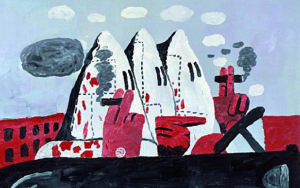By Dan Domench
 Directors must satisfy an audience’s expectation of spectacle using crude tools: guns, cars, make-up, sex, dance, romance, melodrama; but only the great auteurs acknowledge this anticipation directly honoring what we know in our guts to be true, that we are watching animation—a cartoon.”
Directors must satisfy an audience’s expectation of spectacle using crude tools: guns, cars, make-up, sex, dance, romance, melodrama; but only the great auteurs acknowledge this anticipation directly honoring what we know in our guts to be true, that we are watching animation—a cartoon.”
I was 19 when I wrote that line in one of a series of movie reviews published in the student newspaper of the college I attended in California. Somehow these alcohol-fueled arrogant articles resulted in my sitting across from a famous art critic in the dark living room of his home in the Oakland hills as he read that sentence out loud.
He exhaled cigarette smoke showing teeth and leaned back in the leather couch, his long body more coiled than relaxed. The sedation from the pint of Southern Comfort I nearly finished driving up the hills to his Spanish-style house was no longer tamping my anxiety. I lit a cigarette of my own. I had prepared for this by reading his most recent book, underlining phrases to break down his paragraph-long sentences. I stuffed his last two essays from ARTnews and the New York Review of Books into my mind. His intense writing seemed to communicate something important about society that I could not always follow, but it was clear the work of the artists he analyzed was secondary to his larger truths. This hot summer afternoon he was interviewing me for a paid fellowship at UC Berkeley in art criticism, and we were two hours into the conversation.
“Your reviews strive to entertain,” he said, “and this effort encourages me to like you. But what if you focused on just one of the ideas you throw around, no matter how absurd? Apply the idea to literature, painting, any art form. Then research and write a book raising yourself above the fray, telling readers why your idea matters, how it illustrates the mess we live in today. How far, for example, could you push your idea that great directors are con men manipulating society for money and status to no good end?”
“I never said directors are con men,” I said. “I think it’s clear I love film. I just want it to be good.”
“Love,” he said, “and wanting. And here you are. You’ve made no effort to mention my work or try to convince me that you’re interested in being a colleague or even a friend. You want me to think you are simple in your thoughts, but twice you used phrases from my last book and looked at me to see if I recognized them. And you drank alcohol in your car in my driveway where you knew I could see you and stood close enough so that I could smell it on you which only dramatizes a weakness serving as an excuse for future betrayal. You present yourself as an innocent and that makes you dangerous. I’m sure you’ll write about me and this interview and my ridiculousness.”
“I won’t do that,” I said, “and I won’t pursue this further.”
“Nonsense,” he said. “Let’s have a scotch. I’m recommending you for the fellowship.”





0 Comments